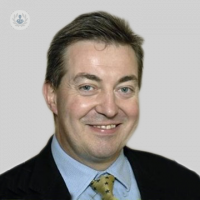Penile size concerns: Realities and risks explored
Written in association with:The perception of what constitutes a normal penis size has long been a topic of discussion, shaped by societal and cultural influences linking a larger size to masculinity and sexual prowess. Despite the majority of women expressing satisfaction with their partner's dimensions, a significant percentage of men still desire a larger penis, often influenced by societal benchmarks like pornography. This pursuit can lead to a condition known as small penis anxiety (SPA), which may escalate to body dysmorphic disorder (BDD) or specifically, penile dysmorphic disorder (PDD). Unfortunately, these concerns may drive some individuals to seek nonevidence-based solutions, posing serious risks to their health. In his latest online article, Mr Gordon Muir gives us his insights.

Current challenges and psychological impact:
Men experiencing SPA or PDD may not necessarily have a smaller-than-average penis; rather, their distress stems from a preoccupation with size and a persistent desire for enhancement. This psychological condition is associated with lower sexual satisfaction and can lead to attempts at penile enhancement, often without proper counselling or consideration of potential risks.
Diagnostic tools and interventions:
Recent years have seen the development of diagnostic tools such as nomograms, screening questionnaires, cohort studies, and consensus papers to identify, counsel, and treat men with SPA or PDD. However, there is a lack of evidence regarding effective treatments for men concerned about penile size, both nonsurgical and surgical.
Scientific review and methodology:
To address this gap, a systematic review of the literature was conducted, focusing on surgical and nonsurgical interventions for men without physical penile abnormalities seeking to increase penis size. The study covered a range of interventions, including penile extenders, injectables, vacuum devices, psychoeducation, suspensory ligament incision, and autologous tissue grafting.
Nonsurgical treatments:
Among nonsurgical interventions, penile extenders showed limited evidence in favour of increasing both length and girth. However, the gains reported were relatively small, and complications, including pain and numbness, were observed in some cases. Injectable substances, such as hyaluronic acid gel and polylactic acid, demonstrated a statistically significant increase in flaccid girth, but complications were noted in a percentage of cases. Vacuum devices did not provide a significant increase in flaccid stretched penile length.
Surgical treatments:
Various surgical methods were explored, including suspensory ligament incision and autologous tissue grafting. Suspensory ligament incision, either alone or in combination with other techniques, showed diverse outcomes with modest length and girth increases. Autologous tissue grafting, utilising dermal fat tissue or engineered tissue, demonstrated varying degrees of success. Complications were relatively common, including oedema, scarring, unnatural hair growth, and penile retraction.
While there is a growing body of research on interventions for men concerned about penile size, the overall quality of evidence remains low. Both nonsurgical and surgical approaches have limitations, and the psychological aspect of penile dissatisfaction is yet to be fully addressed. Further research and standardised assessments are crucial to providing effective counselling and treatment options for men grappling with concerns about their penis size. Physicians and patients alike should be informed about the current scientific evidence to navigate through the plethora of options and avoid unnecessary and risky procedures.
Mr Gordon Muir is an esteemed consultant urologist. You can schedule an appointment with Mr Muir on his Top Doctors profile.


